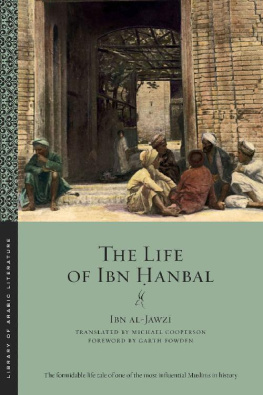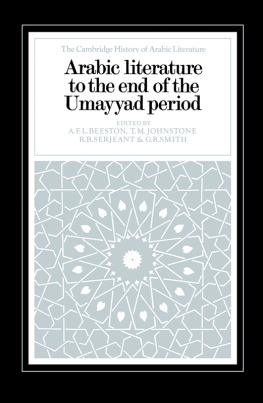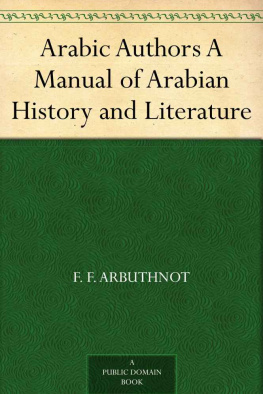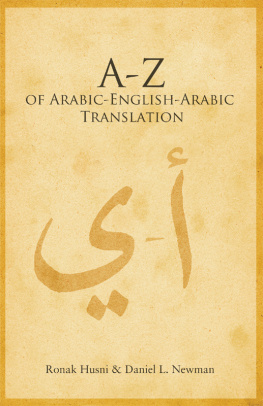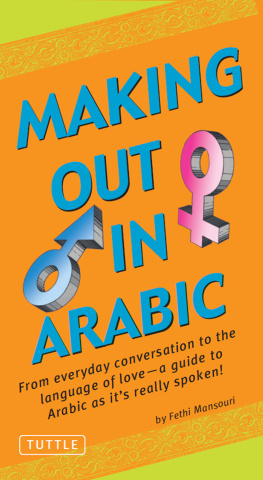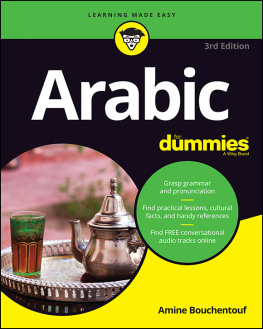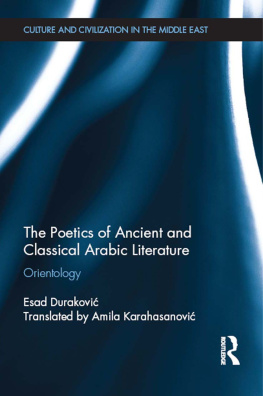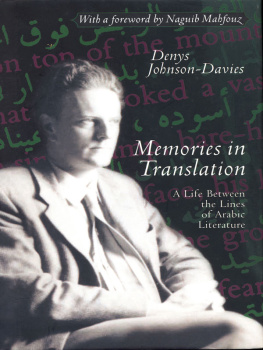Ibn al-Jawzī - The Life of Ibn Ḥanbal (Library of Arabic Literature)
Here you can read online Ibn al-Jawzī - The Life of Ibn Ḥanbal (Library of Arabic Literature) full text of the book (entire story) in english for free. Download pdf and epub, get meaning, cover and reviews about this ebook. year: 2016, publisher: NYU Press, genre: Detective and thriller. Description of the work, (preface) as well as reviews are available. Best literature library LitArk.com created for fans of good reading and offers a wide selection of genres:
Romance novel
Science fiction
Adventure
Detective
Science
History
Home and family
Prose
Art
Politics
Computer
Non-fiction
Religion
Business
Children
Humor
Choose a favorite category and find really read worthwhile books. Enjoy immersion in the world of imagination, feel the emotions of the characters or learn something new for yourself, make an fascinating discovery.
- Book:The Life of Ibn Ḥanbal (Library of Arabic Literature)
- Author:
- Publisher:NYU Press
- Genre:
- Year:2016
- Rating:4 / 5
- Favourites:Add to favourites
- Your mark:
- 80
- 1
- 2
- 3
- 4
- 5
The Life of Ibn Ḥanbal (Library of Arabic Literature): summary, description and annotation
We offer to read an annotation, description, summary or preface (depends on what the author of the book "The Life of Ibn Ḥanbal (Library of Arabic Literature)" wrote himself). If you haven't found the necessary information about the book — write in the comments, we will try to find it.
Ibn al-Jawzī: author's other books
Who wrote The Life of Ibn Ḥanbal (Library of Arabic Literature)? Find out the surname, the name of the author of the book and a list of all author's works by series.
The Life of Ibn Ḥanbal (Library of Arabic Literature) — read online for free the complete book (whole text) full work
Below is the text of the book, divided by pages. System saving the place of the last page read, allows you to conveniently read the book "The Life of Ibn Ḥanbal (Library of Arabic Literature)" online for free, without having to search again every time where you left off. Put a bookmark, and you can go to the page where you finished reading at any time.
Font size:
Interval:
Bookmark:
THE LIFE OF IBN ANBAL
Downloaded via sunniconnect.comLIBRARY OF ARABIC LITERATURE
EDITORIAL BOARD
GENERAL EDITOR
Philip F. Kennedy, New York University
EXECUTIVE EDITORS
James E. Montgomery, University of Cambridge
Shawkat M. Toorawa, Yale University
EDITORS
Sean Anthony, The Ohio State University
Julia Bray, University of Oxford
Michael Cooperson, University of California, Los Angeles
Joseph E. Lowry, University of Pennsylvania
Maurice Pomerantz, New York University Abu Dhabi
Tahera Qutbuddin, University of Chicago
Devin J. Stewart, Emory University
EDITORIAL DIRECTOR
Chip Rossetti
DIGITAL PRODUCTION MANAGER
Stuart Brown
ASSOCIATE MANAGING EDITOR
Gemma Juan-Sim
LETTER FROM THE GENERAL EDITOR

The Library of Arabic Literature series offers Arabic editions and English translations of significant works of Arabic literature, with an emphasis on the seventh to nineteenth centuries. The Library of Arabic Literature thus includes texts from the pre-Islamic era to the cusp of the modern period, and encompasses a wide range of genres, including poetry, poetics, fiction, religion, philosophy, law, science, history, and historiography.
Books in the series are edited and translated by internationally recognized scholars and are published in parallel-text format with Arabic and English on facing pages, and are also made available as English-only paperbacks.
The Library encourages scholars to produce authoritative, though not necessarily critical, Arabic editions, accompanied by modern, lucid English translations. Its ultimate goal is to introduce the rich, largely untapped Arabic literary heritage to both a general audience of readers as well as to scholars and students.
The Library of Arabic Literature is supported by a grant from the New York University Abu Dhabi Institute and is published by NYU Press.
Philip F. Kennedy
General Editor, Library of Arabic Literature
ABOUT THIS PAPERBACK
This paperback edition differs in a few respects from its dual-language hardcover predecessor. Because of the compact trim size the pagination has changed, but paragraph numbering has been retained to facilitate cross-referencing with the hardcover. Material that referred to the Arabic edition has been updated to reflect the English-only format, and other material has been corrected and updated where appropriate. For information about the Arabic edition on which this English translation is based and about how the LAL Arabic text was established, readers are referred to the hardcover.
THE LIFE OF IBN ANBAL
BY
IBN AL-JAWZ

TRANSLATED BY
MICHAEL COOPERSON
FOREWORD BY
GARTH FOWDEN
VOLUME EDITOR
TAHERA QUTBUDDIN

NEW YORK UNIVERSITY PRESS
New York
Copyright 2016 by New York University
All rights reserved
Library of Congress Cataloging-in-Publication Data
Names: Ibn al-Jawzi, Abu al-Faraj Abd al-Rahman ibn Ali, approximately 11161201 author. | Cooperson, Michael translator.
Title: The life of Ibn Hanbal / by Ibn al-Jawzi ; translated by Michael Cooperson ; foreword by Garth Fowden.
Other titles: Manaqib al-Imam Ahmad ibn Hanbal. English
Description: New York : New York University Press, 2016. | Includes bibliographical references and index.
Identifiers: LCCN 2016028108 (print) | LCCN 2016029914 (ebook) | ISBN 9781479805303 (pb : alk. paper) | ISBN 9781479886241 (e-book) | ISBN 9781479870394 (e-book)
Subjects: LCSH: Ibn Hanbal, Ahmad ibn Muhammad, 780855. | Islamic lawBiography.
Classification: LCC KBp310.12653 126513 2016 (print) | LCC KBP310.12653 (ebook) | DDC 297.1/4092 [B]dc23
LC record available at https://lccn.loc.gov/2016028108
New York University Press books are printed on acid-free paper, and their binding materials are chosen for strength and durability.
Series design and composition by Nicole Hayward
Typeset in Adobe Text
Manufactured in the United States of America
10 9 8 7 6 5 4 3 2 1
CONTENTS
FOREWORD
GARTH FOWDEN
During the first half of the ninth century, most of the Abbasid Caliphates subjects were Christians, Jews, Zoroastrians or even pagans. The ruling minority of Muslims faced, at almost every turn, the threator allureof other ways of life and thought, deeply rooted in landscape, history and custom. No wonder they often felt embattled, or succumbed to temptation: it might come in the form of an invitation to a neighbors house, a casual romantic or sexual encounter, or the need to bury a non-Muslim parent. There was, in any event, a need for detailed instruction about everyday deportment. Guidance might be sought in the Quran, but much in it was ambiguous or left unsaid. Traditions about the Prophets sayings and doings (hadiths) proliferated to fill the gap. The eminent legal thinker, al-Shfi (d. 204 H/820AD), strongly advocated the authority of hadiths in his epoch-making Epistle on Legal Theory (recently translated for the Library of Arabic Literature).
In the next generation, Amad ibn anbal (d. 241H/855AD) made a reputation that has never faded, not just as an indefatigable collector of hadiths, but also as one of the greatest exemplars, after the Prophet himself, of the conduct the hadiths prescribed. The numerous responses Ibn anbal offered to enquiries from pious fellow Muslims present a lively picture of daily life in ninth-century Baghdad. In the eyes of ordinary people, however, Ibn anbals reputation rested chiefly on his unflinching endurance of a severe flogging at the command of the Caliph al-Mamn (r. 198218H/813833AD). This was Ibn anbals recompense for insisting on the doctrine of the uncreatedness of the Quran as Gods living word, for which al-Mamn sought to substitute a view of scripture that left room for human interpretation based on reason. Al-Mamn had his own distinctive ideas about interpreting scripture and in general about the sources of authority in Islam; but Ibn anbals resistance contributed decisively to the triumph of scholarly research over caliphal will in determining Muslim doctrine. Increasingly, an attachment to Quranic scholarship was construed as excluding resort to ratiocination or speculationthese were the sins of the philosophers. Whereas al-Mamn was closely associated with the translation of Greek philosophy into Arabic, Ibn anbal would have no truck with such writings, which were neither Arabic nor Muslim.
The anbal schoolnamed for Ibn anbalwas already flourishing by the tenth century, despite competition from other schools of legal thought. It continued to renew itself during the centuries that followed, first in Baghdad, then in Damascus. It prospered less after the conquest of the Arab lands in the early sixteenth century by the Ottomans, who favored the anaf school of legal thought. By one of those symmetries of history that Ibn anbal himself would perhaps have appreciated, it was a little outside the Ottoman domains, in eighteenth-century Central Arabia, that his school experienced its most memorable revival, just as the Prophet himself had arisen in the relative obscurity of the seventh-century Hijaz, to address and resolve the political and theological tensions that were tormenting the neighboring empires of Sasanid Iran andespeciallyEast Rome (Byzantium).
Next pageFont size:
Interval:
Bookmark:
Similar books «The Life of Ibn Ḥanbal (Library of Arabic Literature)»
Look at similar books to The Life of Ibn Ḥanbal (Library of Arabic Literature). We have selected literature similar in name and meaning in the hope of providing readers with more options to find new, interesting, not yet read works.
Discussion, reviews of the book The Life of Ibn Ḥanbal (Library of Arabic Literature) and just readers' own opinions. Leave your comments, write what you think about the work, its meaning or the main characters. Specify what exactly you liked and what you didn't like, and why you think so.

